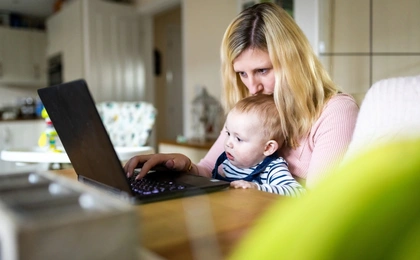Having children is expensive. It's estimated that the cost of raising a child from birth to 18 years old is at least £166,000, or £768 per month.
This is a staggering amount, particularly if you have more than one child. But if you're eligible for Universal Credit, then you may be entitled to help with these costs.
We look into what additional money you can get if you have children and receive Universal Credit.
Having Children may mean you get higher Universal Credit payments
Universal Credit is made up of two parts:
- The standard allowance that everyone who's eligible for Universal Credit gets.
- Extra amounts that you may qualify for, depending on your circumstances.
Having children is one of the circumstances that can entitle you to extra Universal Credit.
If your children live with you, you could get more Universal Credit until the 31st August after:
- Their 16th birthday.
- Their 19th birthday if they're in eligible education or training (e.g., A levels or NVQs up to level 3).
How much you'll get depends on how many children you have and their ages
The extra amount you qualify for depends on how many children you have and when they were born. Different rules apply depending on whether your children were born before or after 6th April 2017,
If your children were born before 6th April 2017
If all your children were born before 6th April 2017, you will be able to claim an extra amount of Universal Credit called a "child amount" or "child element" for each of them. Each month, you could receive:
- £333.33 for your first child.
- £287.92 for your second and any other eligible children.
If your children were born on or after 6th April 2017
If all your children were born on or after 6th April 2017 then you will only be able to claim an extra amount of Universal Credit for your first two children, even if you have three children or more. Each month, you could get £287.92 each for your first and second child.
If you have children born both before and after 6th April 2017
If your children were born both before and after 6th April 2017, then you may only get an extra amount of Universal Credit for some of your children. How much you'll get depends on how many children you have and how many of them were born before 6th April 2017. Let's look at an example:
Let's say you have four children. They were born in:
- 2013
- 2015
- January 2017
- 2019
You will be able to claim an extra amount of Universal Credit for your three children born before 6th April 2017. You will receive no extra amount for the child born in 2019.
If any of your children are disabled, you could get a further extra amount
If any of your children are disabled, you'll be able to claim extra Universal Credit for this, even if you're not getting a "child amount" for that child. How much you'll get depends on the severity of your child's disability. You could get:
- £156.11 per month if your child is disabled.
- £487.58 per month if your child is severely disabled.
You may also be able to claim a further £198.31 per month if you are your child's carer. To get this, you'll need to meet the following criteria:
- You must provide care for them for at least 35 hours per week.
- Your child must get Child Disability Payment or Disability Living Allowance at the middle or highest award rate.
If you receive Universal Credit, you can claim back your childcare costs
If you're working and receive Universal Credit, you may be able to claim back up to 85% of your childcare costs. If you live with your partner, you'll usually both need to be working or have a job offer to be eligible to do this. It doesn't matter how many hours you are each working.
Your childcare needs to be with a registered provider. For example, a nursery, childminder, or before/after school club. You'll need to pay for your childcare up front and claim it back as part of your Universal Credit payments. If you need help to pay your childcare bills in the first place, then you may be able to get this by speaking to your work coach or the Universal Credit team.
The most you can claim back each month is:
- £1,014.63 for one child.
- £1,739.37 for two or more children.
Depending on your child(ren)'s age(s), you may be entitled to some free childcare hours under the childcare for working parents scheme. This could help bring your childcare costs down even further.
You can also claim Child Benefit for further help with your children's upkeep
You may be eligible to claim Child Benefit for further money to help with the cost of raising your children. This benefit is available to all parents and guardians, whether they're eligible for Universal Credit or not. You'll usually be eligible if:
- Your child lives with you and you are responsible for their upkeep.
- Your child is under 16 (or under 20 if they are still in approved education or training).
There's no cap on the number of children you can claim Child Benefit for. You'll get:
- £25.60 per week for your eldest or only child.
- £16.95 per week, per additional child you have.
Child Benefit is usually paid every four weeks, but if you receive Universal Credit, then you may be able to arrange for it to be paid weekly instead.
What you receive may be limited by the benefit cap.
How much extra Universal Credit you receive for your children may be limited by the benefit cap. This is in place to restrict the total benefits a household can receive per month. Both Universal Credit and Child Benefit count towards your benefit cap. If you go over, then one of your payments will be reduced. Usually, this is your Universal Credit payment.
Sources
Helen is a personal finance editor who’s spent 11 years (and counting!) in the finance industry. She creates content on everything money with the goal of getting people thinking – and talking – about their finances in ways they may not have done before.










